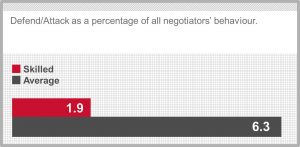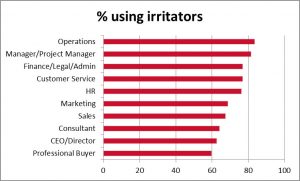In my first blog introducing our latest negotiation research, I explained that our main focus is on the verbal behaviours used in negotiation, by the skilled negotiator. In this blog I am going to introduce you to one of the most interesting behaviours that was identified during the original observational research. In Huthwaite we call this behaviour an “Irritator”.
What is an Irritator?
The Irritator is a behaviour that emerged through the original analysis of negotiation behaviour and was defined as: words or phrases which have the potential to irritate through self praise or condescension, lack any persuasive function and are used to describe a person’s own position or proposal. Examples are words such as: “fair”, “reasonable”, “generous” etc. The key point about irritators is their propensity to irritate, unlike the more obvious Defend/Attack behaviour, which was identified through Neil Rackham’s earliest work on verbal behaviour. Defend/Attack is a behaviour that attacks another person either directly, or by defensiveness, and is generally focused on the person, not the issue at stake. Defend/Attack behaviours may involve
value judgements and often contain emotional overtones. So in the 2014 global survey we invited respondents to indicate whether they would use these two behaviours; the examples being:
It’s a reasonable offer (referring to their own offer) – the Irritator.
You really need to sharpen your pencil – the Defend/Attack.
Now most people, when faced with these behaviours, would probably regard the first one as rather innocuous and perfectly safe to use, whereas the second one appears more aggressive and challenging. The results of the global survey bore this out: 71% of our respondents said that they would use the irritator and only 23% said that they would use the Defend/Attack.
The use of Irritators by the skilled negotiator
What we found in the original negotiation research was that the skilled negotiator did indeed avoid Defend/Attack: it represented only 1.9% of skilled negotiator behaviour, compared to 6.3% of average negotiator behaviour. That is not to say that effective negotiators would never use this behaviour. Defend/Attack has its place in any behavioural repertoire but is effective when used minimally, but with real impact. The real danger with Defend/Attack is that it can quickly disintegrate into what we call a Defend/Attack spiral, where I attack you, and you respond either defensively or by attacking me back, which then results in another Defend/Attack from me, and so on. That does nothing to generate a win/win negotiation outcome.
 Avoiding Defend/Attack may be obvious; but often what we see happening is that as the tension rises and negotiators try to avoid using Defend/Attack so the number of irritators used increases. Our observational research found that skilled negotiators were the ones who could avoid this happening. In an hour of speaking time the average negotiator would use 10-11 irritators, whereas the skilled negotiator would use two or three. This is because the skilled negotiator recognised (perhaps unconsciously as often happens with behaviour) that Irritators had the potential to create as difficult a climate in the negotiation as the Defend/Attack above. I might think that I am being fair and reasonable, or generous, but the other side might not think so, and this is what causes the climate to disintegrate.
Avoiding Defend/Attack may be obvious; but often what we see happening is that as the tension rises and negotiators try to avoid using Defend/Attack so the number of irritators used increases. Our observational research found that skilled negotiators were the ones who could avoid this happening. In an hour of speaking time the average negotiator would use 10-11 irritators, whereas the skilled negotiator would use two or three. This is because the skilled negotiator recognised (perhaps unconsciously as often happens with behaviour) that Irritators had the potential to create as difficult a climate in the negotiation as the Defend/Attack above. I might think that I am being fair and reasonable, or generous, but the other side might not think so, and this is what causes the climate to disintegrate.
Global survey results on the use of Irritators
Irritators do not just cause offence in negotiation. A couple of years ago I was analysing a complaint call, where the customer was clearly unhappy with the solution being offered by the customer service advisor. But when the advisor used the words “With all due respect” the customer changed from being clearly unhappy to being explosively angry, spent three minutes shouting and threatening the advisor and then slammed the phone down. Interestingly, amongst the job roles represented amongst our 1300+ respondents to the global survey, Customer Service are amongst the most likely to use Irritators, whilst those job roles that are more likely to take part in commercial negotiations (Professional Buyers, CEOs and Salespeople) are amongst the least likely to use them. But taken in the round, the use of Irritators by business people of all kinds is too high for comfort, given the harm they can cause in negotiation.

The job role data also reveals that the heaviest users of Irritators are Operations and Managers, which suggests that they could well be impacting on the quality of the relationships within companies which could consequently impact on performance.
The real problem with Irritators is that you are not always aware that you are using them. It is not the intention to upset the other side, but it can happen anyway. The 2014 survey revealed that people who rated themselves as successful in their negotiations were less likely to use Irritators and Defend/Attack than other respondents. So both are behaviours to be aware of when sitting at the negotiating table.








